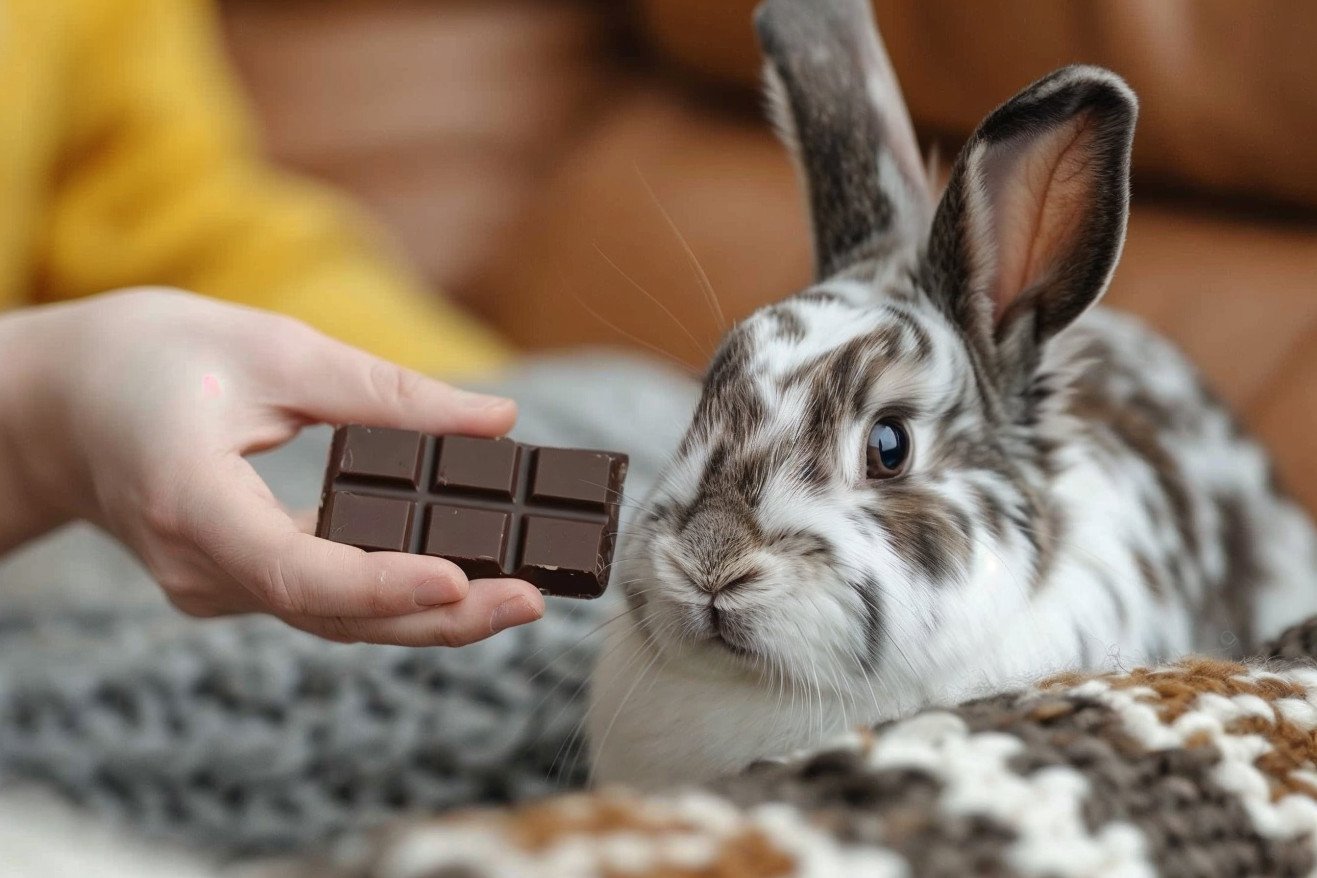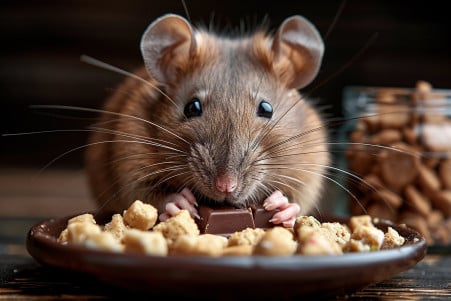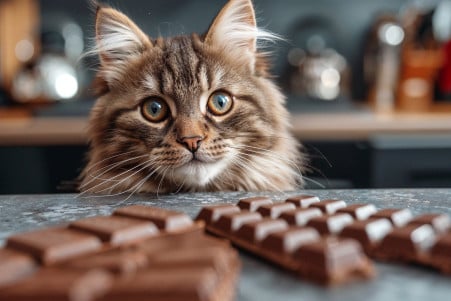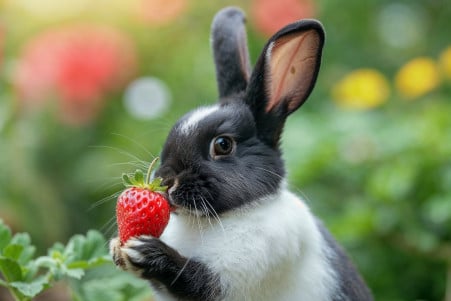Why Chocolate is Toxic to Rabbits? A Scientific Explanation
9 April 2024 • Updated 9 April 2024

Despite being a popular pet-friendly treat, chocolate is actually toxic to rabbits. This is because chocolate contains theobromine and caffeine, both of which are toxic to rabbits and are not metabolized well by their bodies. Even a small amount of chocolate can cause vomiting, diarrhea, heart problems, seizures, and even death in rabbits. Therefore, it is important to avoid giving rabbits any chocolate and to only feed them foods that are safe for them to eat.
In addition to discussing the dangers of feeding rabbits chocolate, we will also look at the science that explains how toxic chocolate is to rabbits and why their bodies can't process these substances. By referencing veterinary and rabbit-specific research, we will explore the biology of a rabbit's digestive system to explain why the effects of chocolate can be so severe. This will help you better understand how to care for and safeguard your rabbit from this potential danger.
Can bunnies eat chocolate?
Why Is Chocolate Dangerous to Rabbits?
Chocolate is dangerous to rabbits because it contains two compounds that rabbits can't metabolize - theobromine and caffeine. These two compounds are methylxanthines, which rabbits can't metabolize due to their unique digestive and physiological systems.
Even small amounts of chocolate can cause a toxic buildup of these compounds in rabbits, according to the Merck Veterinary Manual. The concentration of theobromine and caffeine in chocolate can vary, but dark chocolate contains about 150-160mg of methylxanthines per ounce, while milk chocolate contains 64mg per ounce.
Rabbits don't have the enzyme systems necessary to metabolize theobromine and caffeine, which leads to a buildup of these compounds in their bodies. This can cause cardiovascular problems like arrhythmias, as well as central nervous system dysfunction. Symptoms of toxicity typically start 6-12 hours after ingestion and can last for up to 72 hours, so it's important to seek veterinary care as soon as possible.
The danger of chocolate poisoning depends on the type and amount of chocolate ingested. Dark chocolate is the most dangerous because it contains the most theobromine, while white chocolate is the least dangerous because it contains the least amount of methylxanthines, if any. However, no chocolate should be fed to rabbits to avoid potentially life-threatening complications.
Signs of Chocolate Toxicity in Rabbits
Even small amounts of chocolate can cause a variety of symptoms in rabbits, including vomiting, diarrhea, increased heart rate, hyperactivity, tremors, and difficulty breathing, according to Can Rabbits Eat Chocolate? — Rabbit Care Tips. The Vetwest Veterinary Clinics notes that the type and quantity of chocolate ingested will determine the severity of the symptoms, with dark chocolate being the most dangerous because it contains the most theobromine.
As mentioned by PetMD, the symptoms of chocolate toxicity can be mild to severe, and there may be a delay between the time of ingestion and the onset of symptoms. If you suspect your rabbit has eaten chocolate, it's important to get them to a vet immediately, even if they don't seem to be showing any signs of distress. This is because the toxins can build up in their system and lead to complications, such as seizures, heart arrhythmias, and organ damage.
What to Do If Your Rabbit Eats Chocolate
If you suspect your rabbit has eaten chocolate, it is important to act quickly. The Merck Veterinary Manual notes that the first thing you should do is call your vet and get your rabbit in for treatment. Depending on the situation, your vet may recommend inducing vomiting with apomorphine or hydrogen peroxide to get the chocolate out of your rabbit's system. They may also give your rabbit activated charcoal to help absorb any remaining toxins.
In more serious cases, your vet may need to provide supportive care, including giving your rabbit fluids, anti-arrhythmic drugs, or even general anesthetics to help control tremors and seizures, says PetMD. Throughout the treatment process, your rabbit will need to be closely monitored because the effects of chocolate toxicity can last up to 72 hours, meaning that they may need to be treated for several days.
Because even small amounts of chocolate can be fatal to rabbits, it is important to get your rabbit to the vet as soon as you suspect they have eaten chocolate. However, if you do this and follow your vet's instructions, you can help your rabbit recover from chocolate poisoning.
Bunny-Proofing Your Home and Storing Chocolate Safely
In addition to proper storage of chocolate, keeping rabbits safe in the home requires bunny-proofing to prevent accidental ingestion of toxic substances. According to the Pet Poison Helpline, rabbits are inquisitive animals that will often explore electrical cords, human foods, and medications, all of which can be toxic if ingested. To ensure a safe environment, it's important to protect cords with protective tubing, store chocolate and other toxic foods in places that rabbits can't access, and use baby gates to block off areas that pose a risk.
BinkyBunny suggests using wire cube shelving units and 2x4 lumber to block off areas like doorways, the backs of couches, and other places where rabbits might be able to hide. In addition, noise-making devices with remote controls can be used to scare rabbits out from under furniture. Of course, it's also important to supervise rabbits whenever chocolate is in the home, as even a few crumbs can be dangerous.
With the right precautions in place, including bunny-proofing and proper storage of chocolate and other hazards, rabbit owners can minimize the risk of accidental poisoning and ensure their pets stay safe and healthy. Vets and other rabbit care experts can offer further advice on how to set up a safe and healthy environment.
Healthy Options and Safe Treats for Rabbits
It’s important to make sure that rabbits have a well-rounded diet. The Best Friends Animal Society recommends that hay should make up 80-90% of a rabbit's diet, and that the best hays to feed rabbits are grass hays, such as timothy, orchard, and oat. Rabbit pellets should be fed in small amounts, with the recommended serving for an adult rabbit being 1/4 cup.
When it comes to treats, the Animal Trust suggests that rabbits can have around one handful of fresh vegetables and greens a day, as well as a small amount of rabbit pellets or nuggets. Fruits can be given to rabbits in small amounts that are 1-2 times a week. BunnyEat notes that rabbits can have safe treats like fresh fruits and vegetables and hay-based snacks, but rabbits should never be given chocolate or other human foods.
Making sure that rabbits have the right chew toys and activities can also help to make sure that they don’t start to eat things that they shouldn’t. It can also help to keep them mentally engaged. By making sure that rabbits are eating a diet that consists of hay, vegetables, and limited treats, rabbit owners can make sure that their rabbits are getting the nutrition they need and avoid the health problems that come with chocolate and other toxic human foods.
Conclusion: Keeping Your Rabbit Safe and Healthy
Rabbits have very specific dietary needs, and chocolate is not part of a healthy rabbit diet. Hay should make up the bulk of a rabbit's daily food intake, at 80-90%, with a mix of fresh vegetables and a small amount of pellets or nuggets making up the rest. The RSPCA says that rabbits should be given at least one bundle of hay per day, along with a handful of leafy greens and a small portion of pellets.
The Blue Cross suggests a diet that is 85-90% hay or fresh grass, 10% fresh veggies, and 5% high-fiber pellets. Rabbit.org recommends that 75% of a rabbit's vegetable intake should be leafy greens, with the other 25% coming from non-leafy greens. Fruits should make up less than 5% of a rabbit's diet and be considered a treat.
By making sure that rabbits are given a healthy diet and the right kind of chew toys, rabbit owners can make sure that their rabbits are getting the nutrition that they need while avoiding the dangers of chocolate and other human foods. Vets and reputable rabbit care sites can also help rabbit owners make sure that they're providing a safe, stimulating environment for their rabbits.


